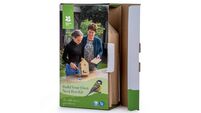Elf and safety at home — during the most chaotic time of the year

Pic: iStock
Christmas can make home somewhat unrecognisable for children. There’s the bauble-laden tree, the festooned decorations, mysterious brightly-coloured packages, visitors coming and going, and different and lovely food.
With its wonderfully chaotic upending of normal life, it's a time when adults need to keep an eye on little ones — so tears and trips to A&E don’t become part of the experience.









